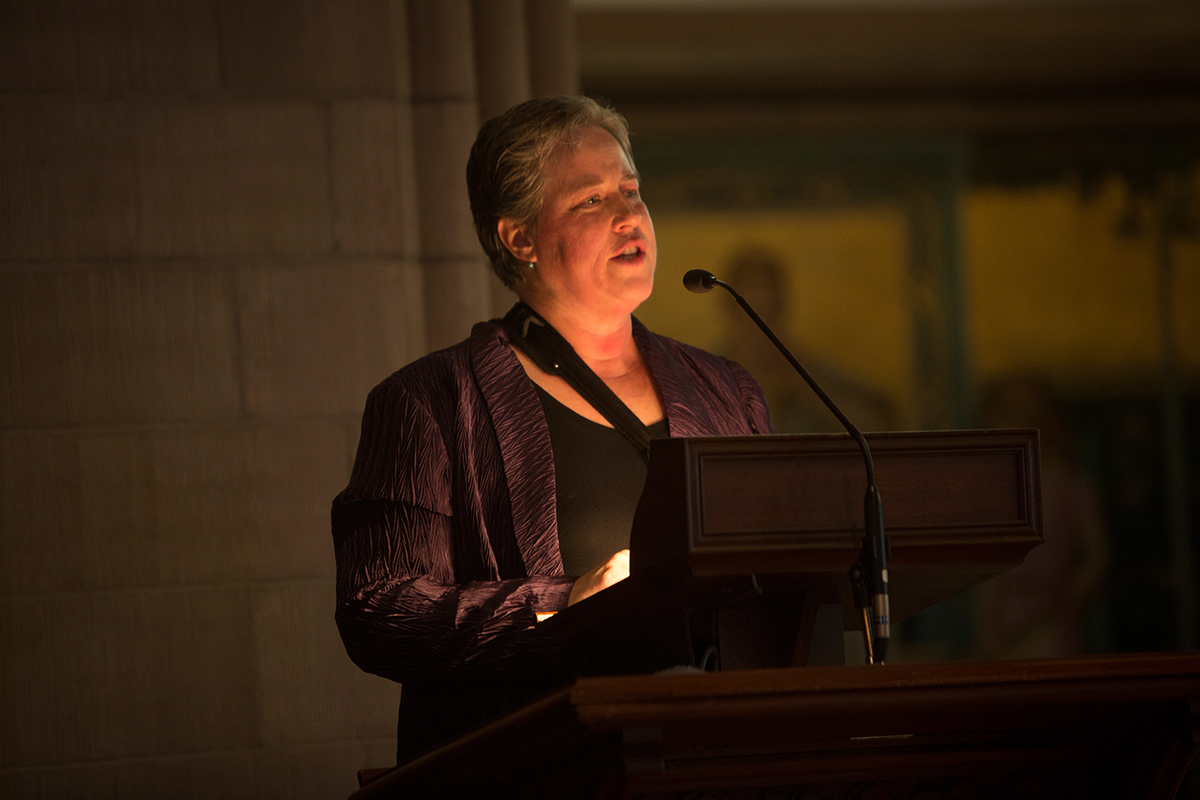Kathy Zoner reflects on hope, family, law enforcement
By Nancy Doolittle

What is it like to be Cornell’s first female police chief? To regularly respond to people in crisis and to still have hope?
With anecdotes, humor and a touch of sobering reality, Cornell Police Chief Kathy Zoner answered those questions for an audience of more than 150 at the final Soup and Hope talk for the semester, April 14 in Sage Chapel.
For Zoner, the search for hope is a daily battle, made easier by the joy, balance and sense of community that her wife, Kathleen, and their three 11-year-old children bring into her life. Hope comes from perseverance, she said, from “trying over and over again to get what you think you desire,” even if it means overcoming years of suppressing emotions that might betray you as being “different.”
Zoner said when she was young the evidence of her “difference” was everywhere, though she could not articulate it: a closet full of unused dolls but a vast, well-loved collection of stuffed animals; tantrums when she learned that Girl Scouts don’t go on long hikes; not understanding why wrestling with the boys was inappropriate at age 12. Her mother remembers her as an 8-month-old child happily escaping her crib, and said she was a “difficult child to contain.” Zoner remembers being full of hope, even as she railed against societal norms.
As she got older, Zoner sought the approval of her peers and parents by “normalizing” her behavior – dressing up, wearing makeup, dating men (“well, one, anyway”). “This is when I started to lose hope,” she said. “I was ‘right’ in the eyes of the world, but wrong in my heart. I had a very loving family; a good, supportive way of life, but I felt lost.”
She became an expert “stuffer of feelings, quasher of turmoil,” even in the midst of personal tragedy.
Zoner studied animal science in college, in preparation for becoming a veterinarian, but by commencement she decided not to pursue graduate work. She took various jobs – stocking shelves at Kmart, mowing lawns, teaching women in pre-release prison, carpentry – before she eventually applied for and was accepted into the Cornell Police as a dispatcher and then a patrol officer.
“I liked the job. The job liked me. I moved quickly through the ranks,” she said.
The career gave her life meaning: “I hated to see people treated unfairly, and I desired to see those responsible held accountable and brought to bear for the pain they caused others. I wanted order, to keep people safe so they would not have to suffer the hurts that I had. It wasn’t just a job – I was finally really helping others and making a difference – most of the time.”
Her ability to stuff her feelings was a strength: “When people feel unsafe, when they want a problem solved or to feel protected, my containment of emotion says to them, ‘She is strong and dependable – I trust her to help me,’” Zoner said.
Working in law enforcement made suppression of emotions even more necessary; as a woman, showing emotions would have been viewed as a sign of weakness, she said.
But it takes a toll: “I and my excellent team of talented professionals have too often seen death and injury of many too young, families devastated through loss and criminal acts, people going at each other for the pettiest of grievances,” Zoner said.
Like other first responders, Zoner has had to learn to contain her emotions in times of crisis, and to be present emotionally in her personal life: “To be the parent and partner I want to be, I have learned the importance of letting those closest to me in, of taking in how others truly care about how I am doing.”
She perseveres in her search for hope daily, drawing strength from a quote by Ayn Rand: “‘Do not let your fire go out, spark by irreplaceable spark, in the hopeless swamps of the not-quite, the not-yet, and the not-at-all. Do not let the hero in your soul perish…. The world you desire can be won. It exists … it is real … it is possible … it’s yours.’”
Media Contact
Get Cornell news delivered right to your inbox.
Subscribe